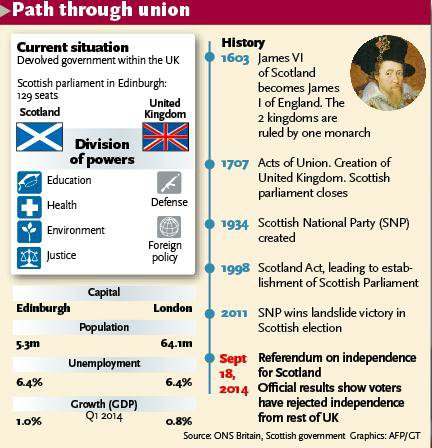Scotland says no – for now
Cameron claims case ‘settled for a generation’

Scotland's First Minister Alex Salmond looks on at a "No" campaigner during a walkabout in Ellon, Scotland on Thursday. Photo: AP

A historic referendum in Scotland has rejected independence from the UK, but has opened up debate about the political future of the country, as the UK government pledged more powers delegated to all parts of the country.
Opponents of independence won 55 percent of the vote while separatists won 45 percent with all 3.6 million votes counted from a record 85 percent turnout. But leaders from across the UK said the union must change if it is to endure.
British Prime Minister David Cameron said Friday the referendum had produced a "clear result," adding: "Now the debate has been settled for a generation ... there can be no disputes, no re-runs."
The pound rose against the dollar and the euro on the currency markets, and the London stock market rallied sharply in opening trade.
US President Barack Obama Friday welcomed the result, while the European Commission said the Scottish vote was good for a "united, open and stronger Europe."
However, despite conceding defeat and announcing his resignation, Scotland's First Minister Alex Salmond left the door open to a vote in the future, saying that Scots had voted "at this stage" to stay but had shown "substantial" support for going it alone, citing the 1.6 million who backed independence.
"It's a disappointing result but it sets the stage for going forward," Martin Calum, a 21 year-old history student in Edinburgh who voted for independence, told Reuters.
"As long as there are flaws, there will be calls for independence. You can't put the genie back in the bottle once it's out," said the student.
Charlie Jeffery, a professor of politics at the University of Edinburgh, told the Global Times on Friday that the "No" vote is not conclusive, and the Scottish question could come back quickly in the event such as a proposed referendum on the UK's EU membership.
According to polling data, better-off and rural areas tended to vote "No" while urban centers and poorer parts tended to vote "Yes."
The Telegraph said younger people were more likely to vote for independence, with the exception of the 18-24 age group, while pensioners were more inclined to stick with the Union. The three councils with the strongest "Yes" vote had a much younger demographic than the three councils with the biggest "No" vote.
Adrian Rogstad, IHS country risk analyst, told the Global Times on Friday that the rejection of independence is only the beginning of a larger debate about the future of the UK's political system.
Opinion polls showing a surge in support for independence in the two weeks leading up to the vote prompted a rushed British pledge to grant more powers to Scotland.
This has already been met with protests from politicians within the Conservative Party who are angry at the lack of consultation with the UK Parliament and the promises of more funding to Scotland, which already receives more government spending per head than all other parts of the UK, said Rogstad.
In an effort to deflate that anger, Cameron vowed to forge a new constitutional settlement that would grant Scotland the promised powers but also give greater control to England, Wales and Northern Ireland.
"Just as Scotland will vote separately in the Scottish parliament on their issues of tax, spending and welfare, so too England, as well as Wales and Northern Ireland should be able to vote on these issues," Cameron said.
"All this must take place, in tandem with and at the same pace as the settlement for Scotland," he said, suggesting legislation would be drawn up as soon as January.
"Ultimately, the promises of more powers to Scotland could spark a process of federalization in the UK," Rogstad noted.
Agencies contributed to this story